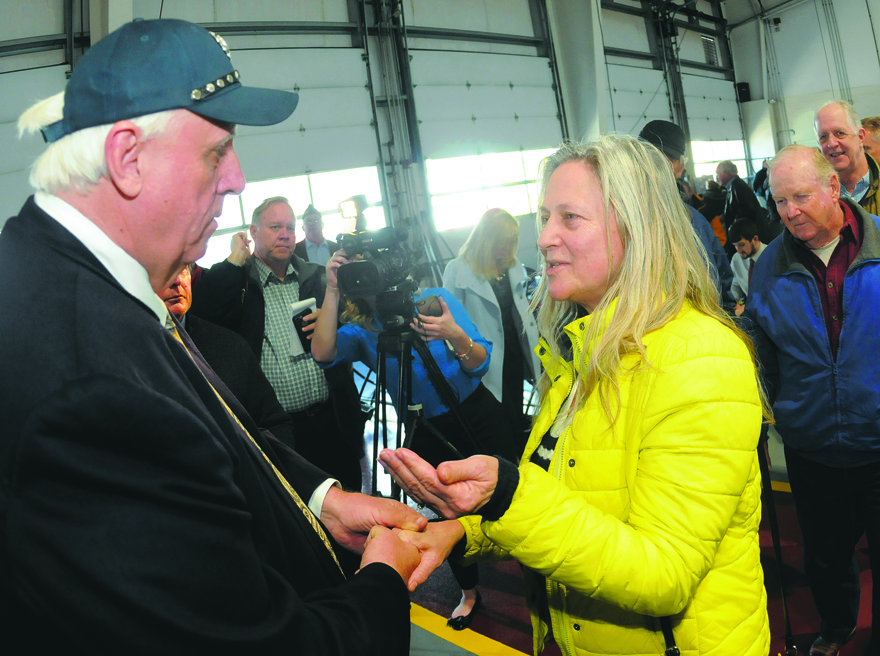By JIM MCCONVILLE
The Journal
MARTINSBURG, W.Va. — West Virginia Gov. Jim Justice insists he doesn’t want to raise the state’s taxes, but says he will be forced to do it anyway to close the estimated $500 million hole in the state budget.

(Photo by Ron Agnir)
Speaking before an estimated150 attendees at Citizens Fire Company in Charles Town on Thursday, Justice continued his “Save Our State” tour by outlining his state budget proposal he says will tackle the state’s gaping budget hole by raising new revenue with a cocktail of new consumer taxes.
Justice said money generated from new taxes will produce an estimated $2.8 billion road construction fund that would to be used to generate an estimated 48,000 construction jobs in the state.
“We are on the verge of a total meltdown,” Justice told the audience. “Jim Justice didn’t create this mess — I just got to the party.”
Justice’s proposed tax package includes a 4 percent increase in the state’s gas tax, a $2-to-$4 state highway toll tax and a $50 increase in Division of Motor Vehicle fees.
“It takes courage to say ‘I am going to raise your taxes,’” Justice said. “I came here for a reason. You have to understand the severity of the problem and do something about it. There is no way out of here, other than this.”

Justice’s tax package calls for a 1 cent tax on every $4 dollars of consumer spending. It also includes a one time tax, based upon West Virginia residents’ income tax bracket.
“If you make over $200,000, you will pay $200 one time; if you make $300,000, you’ll pay $1,000,” Justice said. “What this will do is stabilize the (budget) patient.”
Justice also highlighted job creation needed in the state.
“Today, we have to have jobs. We need immediate jobs, and we have to do it with the roads,” Justice said. “With these taxes, we will have the money to move along immediately. There is $2.8 billion of work lined up. We just have to drop the hammer.”
Justice told attendees his strategy would close the state’s budget gap.
“We are going to get there,” Justice told the audience. “I am willing to go into a room and close the door until we get there.”
In a folksy delivery, often employing colloquial expressions, Justice spoke for nearly two hours, including the fielding citizens’ questions. To illustrate his proposed .25 percent consumer tax, Justice waved four dollar bills in the air.
At one point, Justice distanced himself from the Democratic Party’s recent leaders.
“I am not Hillary Clinton, I am not Barack Obama,” he said.
Questions from the crowd tended to focus on the economy and jobs.
A handful of protesters were present, displaying cardboard signs which read “Democrats made W.V. bankrupt.” One protester said the state had been crippled by years of Democratic sponsored regulation.
“We need a future in West Virginia. I just don’t hear it,” the protester said.
One attendee asked Justice why he had cut fairs and festival funding from the budget.
Justice said the budget had already been restored, as well as $3.1 million in funding for the state’s public broadcasting budget.
Asked about the future of the state’s embattled coal industry, Justice said the state needs to look for other economic drivers.
Even when the coal industry was at its peak, West Virginia ranked last, Justice said.
“We are like a third world country –we mine the coal and we never see it again,” Justice said. “At the end of the day, we don’t want to be holding an empty bag.”
Justice also made it clear he’s no fan of the proposed 8.5 percent sales tax bill being floated in the state Legislature.
“They will have to override my veto,” Justice said. “I really don’t get what they are trying to achieve.”
When asked about legalization of marijuana, Justice said he would support medical marijuana, but “would be absolutely against legalizing marijuana across the board.”
Justice also suggested West Virginia could serve as a backup internet corridor for the region.
“It could be a high-tech internet connection along the Mountain State,”Justice said. “If we could convince the government to build a a redundant (internet) connector across the state.”
Justice said West Virginia would also remain a “horse state.”
“The horsing industry brought the casinos, not the casinos brought the horses,” Justice said. “I am rock solid there will be horses — that will not change.”
See more from The Journal




